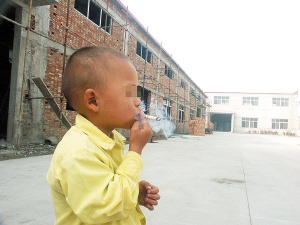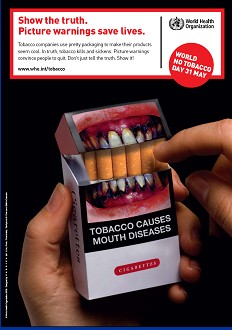Low-tar cigarettes a trap
Joint efforts in tackling the problem
China was 1 of 40 countries to ratify the Framework Convention on Tobacco Control (FCTC), the world's first public health treaty, which calls for regulations on tobacco use and marketing. Since signing, the Chinese government has established a series of policies and measurements, such as raising the tax on tobacco, forbidding people to smoke in some public places and prohibiting tobacco advertisements on TV.
NGOs and news media are an indispensable part of the campaign and can produce successful results the government cannot. After the Health Times reported that the Organizing Committee of the 11th National Games had received a 20 million yuan donation from the Shandong branch of the China National Tobacco Group on September 30, 2009, several groups strongly requested the committee give the money back. On October 15, the money was returned.
Most government measures have little effect. For one thing, the Chinese government still does not have a national law that forbids smoking. Another thing is that tobacco producers constantly change their sales strategies, such as marketing low-tar cigarettes. Tobacco producers use new ways to attract first-time smokers, young smokers, women, health-concerned smokers, etc.
 |
|
Youth are deeply poisoned by cigarettes. |
MPOWER principle to solve the problem
What can help us attack the problem fundamentally? Dr. Sarah England, senior advisor to the WHO Representative Office in China, said during the camp that, "The basic rule and the most useful way is enforcement of the MPOWER principle."
So what is the MPOWER principle? MPOWER is the policy that is carried out by the World Health Organization.
M is for monitoring. Monitor the use of tobacco. It is very important to obtain a national database on tobacco rates for both youths and adults.
P is for protecting. Protect people from the dangers of tobacco. It is important to not allow people to smoke in all indoor public places and all work offices. In fact, we still have a long way to go in China because most cities have few non-smoking areas. Many people worry that if the government forbids people to smoke in all indoor places, it will severely decrease their business, but this is not necessarily so.
O is for offering. Offering programs to help people stop smoking is a great motivator for smokers. In China, many hospitals have already opened clinics to help patients stop smoking.
W is for warning. Warning is very important in China, as many heavy smokers don't realize the dangers of tobacco. They neither know any deep information about tobacco nor can identify strategies tobacco companies use to trick consumers into buying their products. It is necessary for media to propagandize the dangers of tobacco and various advertising tricks. Putting smoking patients' pictures on cigarette boxes have proven useful in getting the message out.
 |
|
Warning words and pictures are effective ways to reduce smoking. |
E is for enforcing. Establishing relevant laws and regulations to completely block all advertisements, sponsorship and sales promotions by tobacco companies.
R is for raising. Raising tobacco tax is a useful combat tool. As China is a developing country, most people are not very rich. Poor people would especially be more encouraged to quit smoking because of the high tax.
Facing the various kinds of advertisement strategies used by tobacco producers, mass media should raise people's awareness of the harm tobacco can cause and promote the development of anti-smoking activities, thereby influencing the government to make the related laws and rules.
 0 Comments
0 Comments






